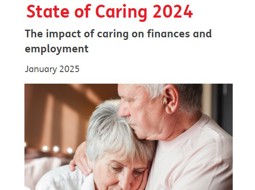A new survey from Carers NI exploring the financial impacts of being an unpaid carer has laid bare the terrible poverty, stress and strain they are experiencing across Northern Ireland.
These impacts include distressing poverty experiences such as feeling hungry but not being able to eat; skipping meals; struggling to buy clothes or shoes; being unable to heat their homes and being in debt.
Crucially, nearly a third of all those who responded to Carers NI's survey said they had to leave the workforce altogether because of the strains of caring.
The 2024 State of Caring survey was informed by over 1,200 local carers who were asked their views on a range of financial, employment and wellbeing issues. Other headline figures from the survey show that:
- 28% are struggling to make ends meet - this figure rises to 44% for those in receipt of Carer’s Allowance
- 58% are struggling to afford electricity and gas, with 45% struggling with other heating costs (eg heating oil)
- 34% are struggling to afford food. Of those who are struggling to afford food, 62% tell us they have skipped a meal, 54% have reduced the size of their meals in order to get by, and 35% have said they felt hungry but didn’t eat
- 44% provide over 90 hours of care per week
- 29% have had to leave the workforce altogether because of the strains of caring
- 52% have had to use their savings in the last 12 months, and 31% are using credit cards.
There are 220,000 unpaid carers in NI, nearly 60% of whom are women. NI has the highest proportion of unpaid carers anywhere in the UK and the highest proportion of people providing the most intense level of care ie 50+ hours. Each year, unpaid carers in NI save the public purse £5.8 billion in care costs, yet carers receive pennies per hour despite providing round-the-clock care.
In the summer of 2024 Carers NI delivered a petition to the Communities Minister signed by 1,393 carers calling for a Carer’s Allowance Recognition Payment of £540 per year for unpaid carers in Northern Ireland. A recent response from the Minister indicated that any budget to facilitate this carers recognition payment would have to be agreed by the NI Executive.
Tracey Henry is a carer from Coleraine who left her job as a teacher to care for her daughter Ellie, now 22, who is quadriplegic, partially sighted and requires percutaneous endoscopic gastrostomy (PEG) feeding.
Tracey said: “I went from a teacher’s salary to being on Universal Credit, only to be told that my Carer’s Allowance will be counted as earnings and deducted from my Universal Credit. It feels like you’re being penalised for being a carer and I know that there are thousands of people in the same boat as me. The Government has to do something to make life easier for unpaid carers."
Tracey said the impact of being an unpaid carer full-time has been life changing for her and family. "Things have been really tight and we’ve had to rely on my parents for financial support. There are so many additional costs when you’re caring for someone with complex needs and we’re having to pay for those things out of our own pocket like wipes and pads, on top of all the everyday basics that we as a family need to get by. There are also higher costs with running a house when you are a carer as Ellie is partially sighted and can’t regulate her own temperature, so she needs the lights and heat on all the time."
Carers NI Policy Officer, Nikita Ferguson said: “This survey on finances and employment shows once again that carers in Northern Ireland are crying out for help. They are struggling with every element of their finances, and they are experiencing terrible poverty.
“At Carers NI we know what would help and that goes from high level visibility in the forthcoming Programme for Government and a brand new carers strategy that replaces the 2006 plan, which is nearly 20 years old.
“On a financial level, carers need stronger levers to help lift them out of poverty. Carer’s Allowance is entirely unfit for purpose, and we need root and branch reform of this system. The low value (£81.90 per week) and eligibility criteria of Carer’s Allowance is trapping unpaid carers in poverty and acts as a barrier to meaningful employment.
“Carers need better information, advice and support as they are struggling with a complicated benefits system. For those juggling caring with employment, paid carers leave would help enormously and especially for women, older workers, and those who can't afford to take unpaid time off. The introduction of a carer’s recognition payment for those in receipt of Carer’s Allowance would lift thousands out of poverty immediately.”
The State of Caring 2024 NI survey results build on the bleak picture of poverty as already reported by the Carer Poverty Commission, which has outlined the policy and legislative supports to help lift carers out of shocking levels of financial hardship.

